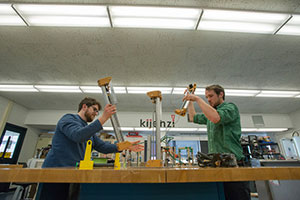Kijenzi engineer Alenna Beroza, is developing solutions to deliver medical equipment using a surprising method — 3D printing.
There has been certain huge challenges in bringing health care to those in need like broken machinery, outdated supply chains and a limited access to specialty equipment and these challenges leaves Kenyan clinics with various critical challenges and therefore Kijenzi is hoping to change that.
Kijenzi, who are grown in the Penn State College of Engineering, Kijenzi’s original intention was to create an easily moveable 3D printer to quickly produce health equipment like braces, clamps and vacuum pumps at low cost.
By working in the Kenyan community, the inventors soon become fully aware that the lack of 3D printers wasn’t the problem. What was really required was entrance to the CAD design files needed to print the equipment.
This changed the teams’s aim and focus from printing to developing a system that allows hospitals to have permission to these files and to trained people to print the parts.
Clinics in Kenya using the Kijenzi system can now produce or “print” the equipment and instrument they need and when they need it.
Director of the Penn State Humanitarian Engineering and Social Entrepreneurship (HESE) program and the co-founder of Kijenzi, John K. Gershenson, said, “Our customers are health care facilities that don’t have permission to the supply chains they require and over 40 percent don’t have the instrument needed to operate their patients. We bring the potential to locally manufacture what they need and when they need it. That is a game changer for permit to treatment.”
The Kijenzi venture team is using Penn State knowledge and expertise to bring 3D printing to rural Kenyan health care facilities. 3D printing can help these facilities manufacture and produce hard-to-get items like anatomical models, replacement parts, and job-related therapy devices.
The Kijenzi system has the ability and capability to impact many people lacking permit to necessary medical equipment in Kenya and around the globe.
Kijenzi has already had requests for nearly 400 different parts in its system. It has broad-reaching suggestions for medical education and other institutional uses as well.
After consequential testing and merging, Kijenzi is now preparing to launch an beginning program (its MVP) in Kenya this May.

